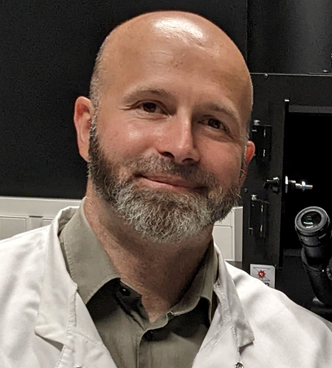Advanced Microscopy for Pandemic Preparedness - Multiplex microscopy assay for viral serology
Speaker: dr Vibor Laketa, Universitätsklinikum Heidelberg, Germany
Talk: Advanced Microscopy for Pandemic Preparedness - Multiplex microscopy assay for viral serology
Time: 14.11.2025
Venue: Intercollegiate Faculty of Biotechnology, Abrahama 58, hall 042B
 Dr. Vibor Laketa is the head of Infectious Diseases Imaging Platform (IDIP) at the Heidelberg University and focuses on providing, developing and applying high-end microscopy infrastructure under enhanced biosafety containment 2 and 3 (BSL-2 and 3) to enable infectious diseases research. Vibor obtained his PhD at the European Molecular Biology Laboratory (EMBL), Heidelberg, Germany where he worked on automated microscopy setups for high-content screening approaches and their application in investigating diverse cellular processes such as signal transduction, vesicle trafficking and neuronal growth. After the PhD he continued his research as a staff scientist at the EMBL where he operated at the interface between advanced light microscopy, robotics, chemical biology and cell biology. In 2013. he joined Heidelberg University to establish the microscopy infrastructure to enable imaging on infectious human pathogens. A comprehensive understanding of host-pathogen interactions requires quantitative assessment of individual molecular events across an entire range of spatiotemporal scales and organizational complexities. Due to recent technical developments, this is currently achievable only with microscopy. Modern microscopes have evolved into complex robotic systems capable of automatically interrogating a wide range of biological processes, from structural studies on molecular scale all the way to whole organ/body imaging in living animals. Furthermore, microscopy-based assays hold immense potential for advancing translational research by revolutionizing drug screening pipelines and enhancing the sensitivity, specificity, and adaptability of diagnostic procedures. As new diseases and therapeutic targets continue to emerge, there is a critical need for rapidly adaptable platforms that can assess their impact on human health. In his seminar he will present how microscopy can be leveraged in the context of viral serology and pandemic preparedness.
Dr. Vibor Laketa is the head of Infectious Diseases Imaging Platform (IDIP) at the Heidelberg University and focuses on providing, developing and applying high-end microscopy infrastructure under enhanced biosafety containment 2 and 3 (BSL-2 and 3) to enable infectious diseases research. Vibor obtained his PhD at the European Molecular Biology Laboratory (EMBL), Heidelberg, Germany where he worked on automated microscopy setups for high-content screening approaches and their application in investigating diverse cellular processes such as signal transduction, vesicle trafficking and neuronal growth. After the PhD he continued his research as a staff scientist at the EMBL where he operated at the interface between advanced light microscopy, robotics, chemical biology and cell biology. In 2013. he joined Heidelberg University to establish the microscopy infrastructure to enable imaging on infectious human pathogens. A comprehensive understanding of host-pathogen interactions requires quantitative assessment of individual molecular events across an entire range of spatiotemporal scales and organizational complexities. Due to recent technical developments, this is currently achievable only with microscopy. Modern microscopes have evolved into complex robotic systems capable of automatically interrogating a wide range of biological processes, from structural studies on molecular scale all the way to whole organ/body imaging in living animals. Furthermore, microscopy-based assays hold immense potential for advancing translational research by revolutionizing drug screening pipelines and enhancing the sensitivity, specificity, and adaptability of diagnostic procedures. As new diseases and therapeutic targets continue to emerge, there is a critical need for rapidly adaptable platforms that can assess their impact on human health. In his seminar he will present how microscopy can be leveraged in the context of viral serology and pandemic preparedness.





